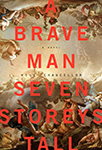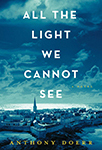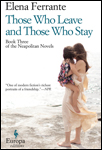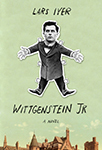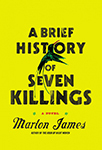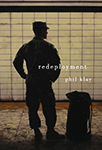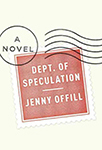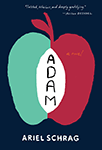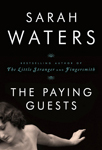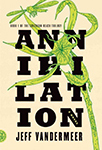by Jesse Ball
30% OFF at Powell’s »J. Courtney Sullivan: First, a confession: When I opened the box from Powell’s and saw the novels I’d be judging, I did a little happy dance around my apartment. Roxane Gay’s An Untamed State and Elena Ferrante’s Those Who Leave and Those Who Stay had been on my list. For months, discerning friends had talked about them over dinner, I had read glowing reviews from writers I admire, and the intriguing hashtag #ferrantefever had popped up again and again in my Twitter feed.
Both books lived up to the hype.
The best feminist novels—or my favorites, anyway—give us a compelling female protagonist who wrestles with the realities of a particular political struggle or cultural moment. I’m thinking of books like Sigrid Nunez’s The Last of Her Kind, Alice Walker’s Possessing the Secret of Joy, Agnes Smedley’s Daughter of Earth.
An Untamed State and Those Who Leave And Those Who Stay are worthy additions to the category. Ferrante and Gay write unflinchingly about the internal lives of women in turmoil. Both give the role of social class its due, which is strangely rare in contemporary fiction. Both explore the ambivalence and joy brought on by motherhood. Both are spot on in their depictions of cyclical poverty and a particular kind of sexual violence that emerges as a result.
Those Who Leave, the third installment of Ferrante’s Neapolitan series, tracks a complicated lifelong friendship between two women from a poor neighborhood in Naples. Their lives take divergent paths. Lila’s education ends in fifth grade; she marries at 16, leaves her abusive husband, and has a baby. At the start of this volume, she lives with a kind man (they sleep in separate rooms), and works in a sausage factory where sexual harassment is rampant. Her coworkers distract themselves with affairs and indiscretions: “…love became a diversion that mitigated the labor and the boredom, giving an impression of real life.”
Elena, who narrates the story, has graduated from a prestigious university, published a novel, and gotten engaged to an intellectual from a prominent family. Even so, she views Lila’s as the superior mind:
I had been forced by the powerful presence of Lila to imagine myself as I was not. I was added to her, and I felt mutilated as soon as I removed myself. Not an idea, without Lila. Not a thought I trusted, without the support of her thoughts.
There’s a deep sense of loyalty between them, but also an underlying rage. Elena harbors a lingering wish that Lila will die.
The story unfolds against a backdrop of 1970s political unrest and feminist awakening. Their hometown is a dangerous place, especially for women. As the book opens, Lila and Elena discover the body of a childhood friend who has been murdered. Elena wonders:
How many who had been girls with us were no longer alive, had disappeared from the face of the earth because of illness, because their nervous systems had been unable to endure the sandpaper of torments, because their blood had been spilled.
In An Untamed State, we meet Mireille, a Haitian-American lawyer. Her parents come from humble beginnings and immigrate to New York as teenagers. In the US, her father amasses a fortune from working in the construction business. He dreams of returning home to Haiti. When he and his wife eventually do, they move into a mansion surrounded by high fences, which block them physically and emotionally from the poverty and struggle on the other side.
This troubles Mireille’s Midwestern husband, Michael. When her parents throw them an elaborate engagement party, the couple feels keenly aware of “the comfortable lunacy of such a beautiful party on a perfectly groomed beach in the middle of a land of starving people.”
In the book’s opening pages, these two separate Haitis collide with disastrous results. The couple and their infant son are visiting her parents in Port-au-Prince, heading out for a day at the beach, when armed men kidnap Mireille. (We learn that such kidnappings are endemic to the culture when Mireille thinks of various other wealthy Haitians she knows who’ve had the same experience.) When her father refuses to pay the million-dollar ransom, she is held for 13 days, raped and tortured by her captors.
After her release, she’s left to cope with the ways in which past traumas shape the present and live on in the body even when they no longer pose a physical threat. As she puts it, “I was free even if I did not know it yet or my body was free and my mind was in the cage.”
Like Elena, who leaves Naples behind, but finds herself haunted by the place and its inhabitants, Mireille says:
We loved Haiti. We hated Haiti. We did not understand Haiti or know Haiti. Years later, I still did not understand Haiti, but I longed for the Haiti of my childhood. When I was kidnapped, I knew I would never find that Haiti ever again.
Here’s what I didn’t consider when I was doing that happy dance a few weeks back: After reading these two fantastic novels, I’d have to choose one over the other. If I could pick them both, I would.
Ferrante writes some of the most starkly fierce, intense prose I’ve ever read. My pen got a serious workout from all the underlining. But Those Who Leave, by no real fault of its own, was at a slight disadvantage because I hadn’t yet read the first two books in the series. In some ways, it stands alone just fine, but without knowing the backstory, I suspected I was missing a certain amount of dramatic payoff. The book manages to be both extremely literary and borderline soap operatic. (I mean that in the best possible way.) It has so many subplots that at times I found it hard to keep them straight. I often flipped to the lengthy list of characters at the front wondering, How did this love triangle form again? Why does X hate Y? Who is this Stefano? (Incidentally, the same questions I asked myself the year I turned 12 and started watching Days of Our Lives.)
In Gay’s novel, the few chapters told from Michael’s point of view left me wanting more, especially the ones in which, through various means, he attempts to rescue his wife. The real strength, the beating heart, of An Untamed State is how Gay creates a character as three-dimensional as Mireille, sparing us none of the agony she endures. The author doesn’t shirk away, but instead fiercely faces the harrowing reality of the situation. It can be hard to read, but the violence is there in service of a larger point. There is nothing gratuitous about it.
An Untamed State had me from start to finish. I devoured it in a day because I needed to know what would happen to Mireille, to Michael, to their son. I haven’t stopped thinking about it since. Next round, here it comes.
Kevin: Although it’s a generalization, it’s also a legitimate knock against American fiction that we don’t write very well about class. No doubt it’s because one of our nation’s foundational myths is that we pretend not to recognize class distinctions: Everyone is middle class and today’s poor Americans are just tomorrow’s one-percenters. Donald Trump, who inherited his father’s real estate company, and whose businesses have declared Chapter 11 bankruptcy four times, has fashioned an improbable twilight career as a financial mentor/political nudge. It’s going to happen to you any day now. And in the meantime, don’t vote to raise my taxes, because you’re not going to want to give up half your dough when you’re pullin’ in the bullion like me.
Most of us prefer to buy Powerball tickets and keep our heads buried in the sands of the beachfronts we’ll never be able to afford. Perhaps the most realistic depiction of class issues in American pop culture today is in the multiple incarnations of Housewifery/Kardashiana, the appeal of which seems to be simply, “I’m rich. No reason. Fuck you.” That’s a more European way for a nation to amuse itself.
Anyway, it’s notable that Judge Sullivan comes out of the gate recognizing the skill with which both of these authors (one of them American!) write about class issues, although it is telling that Gay’s story had to leave the country to do it.
I remember some discussion when the shortlist was being compiled about whether Those Who Leave and Those Who Stay and Annihilation should be considered for the tourney, as each is part of an ongoing series. I stayed out of it because I hadn’t read either book at the time, but I think the conclusion we came to was, “I don’t know. Let’s put them in there and find out.” And the fact that both books won their opening round matches (and Those Who Leave made it all the way to the semis) is a kind of answer. However, like Judge Sullivan, I’ve been asking myself if the sequel status of Those Who Leave didn’t have some impact on my reaction to it.
I honestly didn’t feel that way while reading it. There is a soap opera component to the story—thank you, Judge Sullivan, for saying that first so it doesn’t sound entirely condescending coming out of my mouth—and you certainly don’t need to watch the first 30 years of General Hospital to have played hooky from school because a girl you kind of liked (and who on most days was out of your league) needed a place to watch Luke and Laura’s wedding without her parents finding out she wasn’t in Earth science class. But I did feel insufficiently invested in Ferrante’s characters. At the time, I chalked that up to her style, in which she doesn’t really seem to be writing toward an ending. If you had told me this was the third of a four-part series, or the first of a six-part series, or the ninth of a nonology, I would have believed you in every case. Maybe if I had read the first two I would have felt more urgency.
(I’m not going to read the first two.)
John: I am in the position of having read the first two Neapolitan books, but not our ToB entrant, so I’m in the opposite position of you. I think that I can state that not having started at the beginning likely harms your (or any reader’s) impression of the novel.
The first novel in the series, My Brilliant Friend, opens (after a short framing device) with Elena and Lila as children, serving as a kind of origin story of their complicated friendship/rivalry. It also eases us into the goings on of the neighborhood in a way that is much more organic than some of the summary that leads the second installment and I believe the third as well.
To extend the television analogy, it’s the difference between watching an entire episode and relying on a “last time on [X]” clip parade. As I noted in the opening round booth blather, and Judge Wolitzer discussed in her second round judgement (a mediocre mind and a great mind think alike), the similarities between reading Ferrante’s series and Edward St. Aubyn’s Patrick Melrose novels is pretty striking. I began to think about what it would be like to dip into that series in the middle (or end) and how that might affect a reader’s response.
In the first Melrose novel, Patrick is a small child, tormented in unspeakable ways by his father. In the subsequent novel, Bad News, Patrick is a strung out addict in New York, on his way to pick up his dead father’s ashes. While Bad News is a brilliant short novel in and of itself, being removed not just from the knowledge that Patrick had been abused by his father, but from the actual experience of the abuse as it was rendered on the page, significantly lessens its power.
Reading only Those Who Leave and Those Who Stay denies the reader important parts of the journey. That said, even as I’m looking forward to getting into it, I don’t think there’s a payoff in you going back and reading the first two.
Kevin: Here’s the thing I liked best about An Untamed State. (Somewhat vague spoilery stuff ahead.) Mireille gets kidnapped on page two. We know from the first-person, past-tense narration that she is going to get free from her captors somehow. We even know how many days she will be in captivity. So we endure Mireille’s harrowing, horrible, violent trials at the hands of her tormentors with the expectation that when she gets out, there will be a catharsis. We are going to feel good when she is reunited with her family and the bad guys get all of this evil shoved back down their own throats, Liam Neeson-style. We have read enough books and seen enough movies to know what is coming, and even look forward to it. With her fairy tale conceit, Gay even encourages us to think that way.
And then we never get it. Not like we expect to. I found the ending extremely satisfying, but there was still a whole lot of shit bottled up inside me when it was over. Gay doesn’t give me a proper outlet for it on the page. I loved that. When readers talk about a book that stays with them after it’s over, that’s what they’re talking about, John: All the baggage a novel brings to your house and doesn’t take with it when it leaves.
John: I’m totally, completely, 100 percent in agreement with you on An Untamed State. Gay’s decision to structure the novel in a way that removes the suspense of whether or not Mireille is going to be freed opens the narrative up to much larger possibilities. One of the ways I think about structuring novels as I try to write them is with an eye toward what questions the audience is being asked to consider as they move forward.
A fundamental one is always, “What’s going to happen?” When that question is entirely answered by plot machinations and twists, you get a Dan Brown novel, which can be pleasurable, although for me those pleasures are limited. When we add in “Why did that happen?” or “How did that happen?” we get much more complicated experiences. We know the duration of Mireille’s captivity early on, and coupled with our knowledge of her well-heeled family, the tension runs deep—it has us (me) asking, “Why won’t her father just get her out?” Gay’s choice of structure implicates all of the characters in the novel in the events to come: not just Mireille and her captors, but Mirelle’s father, mother, and husband as well.
The structure also leaves us with a question about what happens after Mireille escapes, and like you, I was impressed that Gay refuses to offer “redemption” or complete healing to her protagonist. I bet, in some ways, that wasn’t easy for her, but to do it differently would make the novel less true. There is no way for Mireille to escape what happened to her. There is no out; there is only through.
Kevin: We are all the way through the semifinals, which means it’s announcement time. As we retabulate the Zombie voting results in the wake of the Ferrante’s loss, we see that, in spite of #FerranteFever, Those Who Leave and Those Who Stay did not receive enough support to put it in the top two. At last, our Only Mostly Dead Rooster entrants have been carved in rock: Emily St. John Mandel’s Station Eleven and Anthony Doerr’s All the Light We Cannot See.
Tomorrow (in Zombie match one), Station Eleven will take on Marlon James’s A Brief History of Seven Killings, and on Monday (Zombie match two) An Untamed State will meet All the Light We Cannot See, with the terrific Elliott and Laura stepping in again with the commentary.
I really like all four of these novels, John. Difficult choices are ahead.



